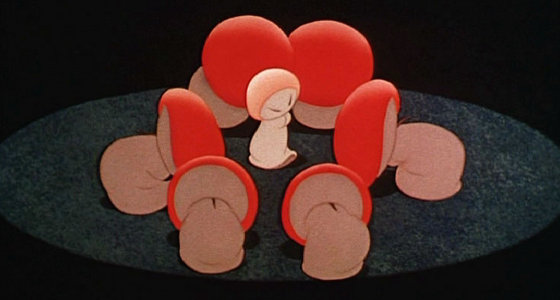httpv://www.youtube.com/watch?v=-GteUS553vI
‘Romeo and Juliet Fantasy-Overture’
By Pyotr Ilyich Tchaikovsky
And now we reach my absolute favourite classical composer, the expressive and bombastic Tchaikovsky. To me, he represents the best elements of the Romantic period in classical music – his melodies are clever and compelling, his compositions are grand in scale and they build steadily in intensity until they usually reach a highly emotional climax. Tchaikovsky tells a story with his music, and you can hear in his work the intent – to take the listener along on a gripping journey.
Most will recognize the central melodic theme of the Romeo and Juliet Overture – it’s been used in TV cartoons for as long as I can remember to indicate when a character has fallen in love at first sight. The first few times I listened to it, I had a hard time not picturing a silly cartoon scene in my head, complete with bulging eyes, wolf-whistles and heart surging out of the chest. However, a much more careful listen will reveal a wonderful piece of music…even if most of us still think of cartoons, we have to admit that such a melody must have had some lasting cultural impact in order to be so easily recognized.
Tchaikovsky was well-known for his ballet music, such as Swan Lake, Sleeping Beauty and The Nutcracker.

Dances inspired by other cultures were another great part of his music
Since the piece I’m talking about today is referred to as an ‘overture’, the natural assumption is that it serves as a prelude to a ballet or opera. However, the 18th century saw the rise of what was known as the ‘concert overture’: a piece of music inspired (usually) by a literary theme, but not connected to any stage work. Therefore, the Romeo and Juliet Fantasy-Overture stands alone, but you could always put it on when reading a bit of Shakespeare. Personally, I prefer to picture a more medieval setting when I listen to the overture…Disney’s use of Tchaikovsky’s Sleeping Beauty ballet music for the motion-picture of the same name is likely the culprit, there.
Some other incredible pieces include his violin concerto in D major, Marche Slave, Capriccio Italien, the 1812 Overture, his piano concerto in B flat minor, his 4th symphony…the list goes on and on. My suggestion to any artist? Throw on some Tchaikovsky when you want to feel inspired. Just as the ‘Classical’ period of composers like Mozart was fairly restrained, the ‘Romantic’ period of Tchaikovsky was passionately expressive.
Leave a Reply